
Projects

Navid Nuur

Call and Response
AMMODO ✕ Kunstinstituut Melly
2024 - 2027
With the new exhibition series Call and Response, Kunstinstituut Melly will present two double solo exhibitions annually from 2024 onwards. In this format, two internationally renowned artists each develop new work that is on display simultaneously, while responding to a changing world.
Pictured: Bewaard, Sijben Rosa, 2023
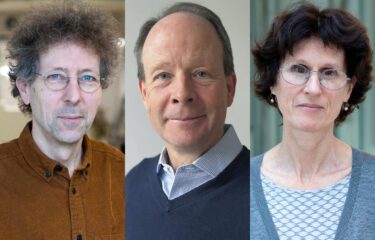
Lipidomics Team – winner
AMMODO ✕ Ammodo Science Award
2024
The Lipidomics Team (University of Groningen) is studying lipid molecules to develop reliable diagnostic tests and effective vaccines against tuberculosis. With more than one and a half million deaths annually, tuberculosis is the deadliest bacterial infectious disease worldwide. Thanks to their innovative research, this group has gained insights into how tuberculosis bacteria survive in the human body using a clever trick to bypass the immune system.
The team expects insights gained here to help them map other important bacterial pathogens. The next step is to set up a research programme on newly discovered lipids in the bacteria that cause typhoid fever, blood poisoning and skin infections.
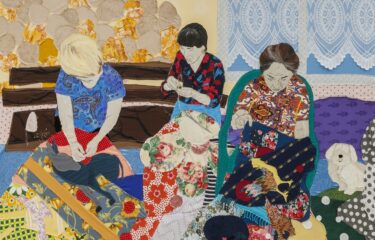
Małgorzata Mirga-Tas
AMMODO ✕ Bonnefantenmuseum
2024
Bonnefantenmuseum presents the first-ever Dutch solo exhibition by Małgorzata Mirga-Tas (1978), a Polish artist who belongs to the Roma people. In her work, she celebrates Roma identity and tries to counter existing stereotypes while mixing the mythic and the everyday experience.
In the exhibition, Mirga-Tas will present a series of tapestries, a series of portraits of Roma civilians in Krakow and a new work pertaining to the history of Settela Steinbach, a girl from Limburg who was filmed as she was put on a train to Auschwitz. Steinbach became the face of the persecution of Jews in the Netherlands, but in 1994 it was revealed that she wasn’t Jewish, but rather belonged to the Roma people.
Pictured: Re-enchanting the World: March, Małgorzata Mirga-Tas, 2022
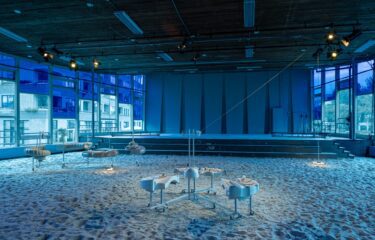
Curatorial Programme
AMMODO ✕ De Appel
2024 - 2026
The Curatorial Programme is the training program for talented international curators at De Appel. For the period 2024-2026, the institute selects one or two curatorial collectives to immerse themselves in the Amsterdam art scene, conduct research in collaboration with tutors and experts, and develop exhibitions and a public programme for De Appel.
From 2024 onwards, the Curatorial Programme is focused on the collective curatorial practice. In doing so, De Appel builds upon the concept of ‘Lumbung’ introduced by ruangrupa during documenta 15 in the Western art sector. Lumbung refers to an Indonesian communal rice barn, symbolising the principles of collectivity, sharing and fair distribution of (financial) resources.
Pictured: The Curatorial Programme 2022, Super Feelings Episode 2. Photo Sander van Wettum.
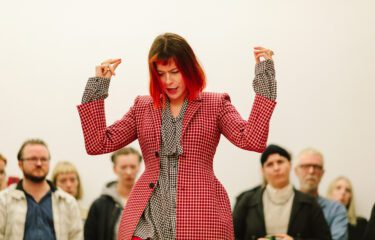
Nora Turato
AMMODO ✕ Stedelijk Museum Amsterdam
2024
In a solo exhibition in the mezzanine of Stedelijk Museum Amsterdam, Nora Turato explores the function of language in a society flooded with information. What information sticks and what is ignored? She urges her audience to reevaluate their relation to language and its underlying power structures.
Pictured: Pool 2 (2018), Nora Turato
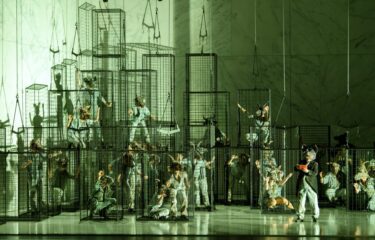
Opera Forward Festival
AMMODO ✕ Nationale Opera & Ballet
2023 - 2027
The Opera Forward Festival (OFF) is an annual festival for new contemporary opera productions. The festival presents opera as a relevant and forward-thinking artform to a wide audience.
Pictured: Animal Farm by Alexander Raskatov at Opera Forward Festival 2023.

Three times left is right
AMMODO ✕ Julian Hetzel
2024
Three times left is right is a theater production by interdisciplinary artist Julian Hetzel about living together in times of radical political ideologies.
The piece is inspired by the controversial book Living with the Left by new-right intellectual Caroline Sommerfeld and her marriage to left-wing sociologist Helmut Lethen.
With Three times left is right, Julian Hetzel continues a long-running investigation into emotions – in this case, hate as a driving force for right-wing radicalism, and love as a survival strategy in times of war.
The play will premiere in 2025 at the Wiener Festwochen and will subsequently be shown in Leipzig and Utrecht (SPRING festival).
Pictured: There Will Be Light, Julian Hetzel, 2022
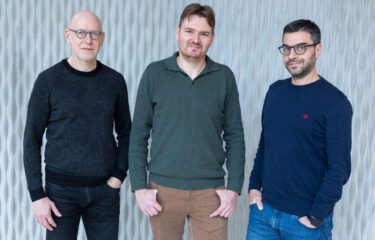
Computational Pathology Group – winner
AMMODO ✕ Ammodo Science Award
2024
The Computational Pathology Group (Radboud University / Radboudumc) is developing software models based on artificial intelligence (AI) that can help pathologists diagnose tumours. The group was one of the first in the world to demonstrate that AI can match and even exceed the performance of human experts in specific diagnostic tasks.
The team is currently working on the world’s first virtual pathologist, ANTONI. This AI model is not only capable of making accurate diagnoses for conditions such as breast, prostate, and kidney cancer, but can also reveal the reasoning behind the diagnoses. This can help medical professionals make reliable diagnoses more efficiently and make the most appropriate treatment decisions for their patients faster.
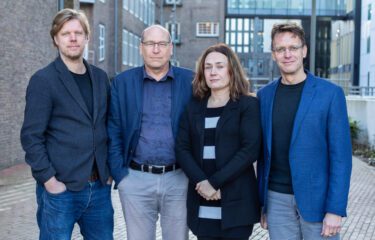
Psychological Methods Lab – winner
AMMODO ✕ Ammodo Science Award
2024
The Psychological Methods Lab (University of Amsterdam) is committed to avoiding ‘model myopia’ in psychology, or the idea that only one correct interpretation of research data is possible. Instead, they emphasise the power of diverse models and argue that methodological diversity is crucial for reliable science. The team develops robust statistics to gain more accurate insights from psychological datasets.
One example is their novel network approach to psychological disorders, in which symptoms and causes are viewed as a complex system of interactions between variables. The team shares their innovative models worldwide via JASP, their self-developed and widely used open-source statistical software package.
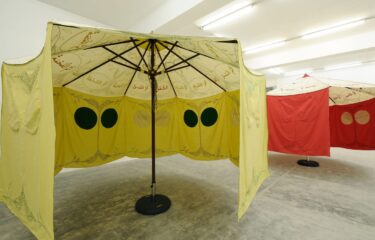
Mounira Al Solh
AMMODO ✕ Bonnefantenmuseum
2025
Bonnefantenmuseum presents the first Dutch solo exhibition by Lebanese-Dutch artist Mounira Al Solh (1978), whose work focuses on topics such as migration, displacement, trauma, language and identity. A recurring theme in her work are Middle-Eastern tents made from traditional materials which she co-creates with visitors, refugees and museum volunteers.
The exhibition will display one of these tents, as well as a number of paintings, tapestries and drawings, including new work by Al Solh. At Bonnefantenmuseum, she aims to give an homage to women who have been historically overlooked.
Pictured: Lackadaisical Sunset to Sunset, Mounira Al Solh, 2019
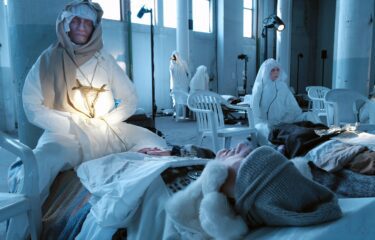
New Body Project
AMMODO ✕ Boogaerdt/Van der Schoot
2024
The artist duo Suzan Boogaerdt and Bianca van der Schoot combines performance and (video) installations. They call their field of operations the ‘grey space’: the zone between the black box (theatre) and the white cube (museum).
This approach is evident in their New Body Project, which they will present in 2024 – a diptych about mourning lost bodies and embodying a new world.
The first part, called WOMBTOMBS, is presented at MU Hybrid Art House in Eindhoven in spring of 2024. It consists of a series of hiding places that are both memorial sites and incubators. These spaces can be visited by the public and will host performances at certain times.
The second part, SONGOFSONGS, takes the form of a multimedia performance which will tour across the Netherlands in the fall of 2024. Here, new forms of existence are presented which were developed in the WOMBTOMBS, merging human, technological and digital ‘bodies’.
Photo: Annaleen Louwes
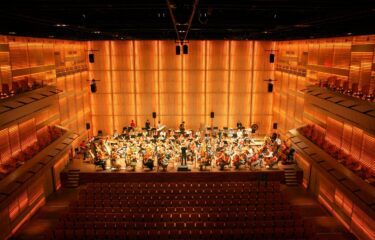
World premieres
AMMODO ✕ Muziekgebouw aan 't IJ
2024 - 2027
As in previous years, Muziekgebouw aan ‘t IJ will (co-)produce three new compositions in contemporary music annually between 2024 and 2027. Dutch and international composers will get the chance to develop their practice and present their own contribution to the canon of contemporary music.
All pieces will celebrate their world premiere at Muziekgebouw. The performances are realised in cooperation with Dutch and international partners including Asko|Schönberg, Cappella Amsterdam, Klangforum Wien and Collegium Vocale Gent.
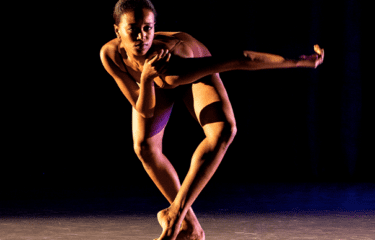
Choreographic Academy
AMMODO ✕ Nationale Opera & Ballet
2025 - 2026
Every other year in the summer, The Dutch National Opera & Ballet organizes the Choreographic Academy: a period of three weeks in which young talented choreographers collaborate with the dancers of the Junior Company.
The Choreographic Academy aims to be a place for research and experiment. A final result in the form of a finished choreography is not a requirement, but it happens regularly.
Pictured: New Moves, 2022 (Photo: Khayla Fitzpatrick)

New productions
AMMODO ✕ Michel van der Aa
2024 - 2026
Ammodo contributes to two new operas by composer Michel van der Aa.
In 2023, Ammodo Docs released the short documentary In Between Realities about the work of Michel van der Aa.
Pictured: Upload, Michel van der Aa, 2020
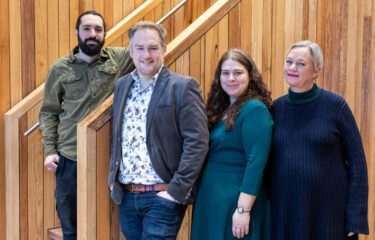
Past ❤ Play – winner
AMMODO ✕ Ammodo Science Award
2024
Past ❤ Play (Leiden University) conducts innovative humanities research into contemporary experience of cultural heritage and how the concept of play can contribute to a deeper understanding of the past. The team discovered that when local communities are actively engaged with the heritage in their environment through play, a stronger connection to these places emerges.
In addition, the team researches historical play practices, for example by having participants play board games from ancients times. This brings new insight into past playing habits and what experiences were associated with them.
As a next step, the team will conduct ethnographic fieldwork in the Netherlands, Morocco and Jamaica to further map different gaming practices and approaches to heritage.

New productions
AMMODO ✕ Festival d'Aix-en-Provence
2025 - 2027
Festival d’Aix-en-Provence, led by Pierre Audi since 2019, is the largest opera festival in France. The festival presents new recitals of existing works as well as new contemporary (opera) productions.
Ammodo supports the development of two new operas per year for the 2025, 2026 and 2027 festival editions.
Pictured: The Faggots and Their Friends Between Revolutions by Ted Huffman and Philipp Venables, Festival d’Aix-en-Provence 2023
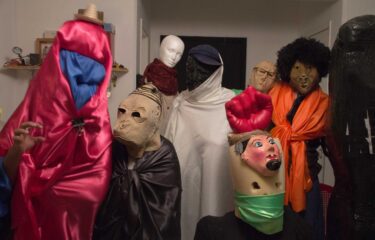
Cráter Invertido
AMMODO ✕ Framer Framed
2025
Cráter Invertido is a collective of eleven artists and activists from Mexico City. In honour of the fifteenth anniversary of the collective, Framer Framed will present a retrospective exhibition of their body of work in 2025, including new commissioned pieces.
Cráter Invertido creates absurd stories through mediums such as (riso)prints and publications, drawings, puppets, video and radio. Their work focuses on subjects such as coexistence, care and the protection of areas where biodiversity is threatened.
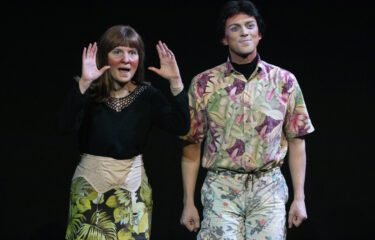
Talent development
AMMODO ✕ Toneelschuur Producties
2024 - 2026
Toneelschuur Productions has selected five young directors to create several new theatre productions in the coming years. These are Abdel Daoudi, Jessie L’Herminez, Koen Verheijden, Angelo Ormskerk and Agnese Kumpina.
Each season, at least four new plays will see their premiere. In addition, Toneelschuur Productions has reserved space for ad hoc productions by guest directors.
Pictured: Dieven, Jessie L’Herminez, 2023
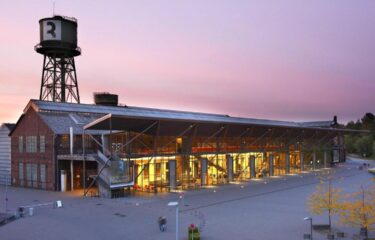
New (co-)productions
AMMODO ✕ Ruhrtriennale
2024 - 2026
The Ruhrtriennale is a renowned annual performing-arts festival in the German Ruhr area. A new artistic leader is appointed every three years. From 2024 to 2026, the festival is led by former ITA director Ivo van Hove. During this period, Ammodo supports several new (co-)productions each year which will premiere at the Ruhrtriennale and are created in cooperation with international partners, including ITA.
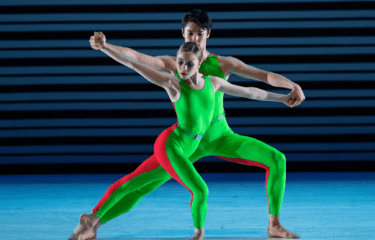
Junior Company
AMMODO ✕ Nationale Opera & Ballet
2024 - 2027
The Junior Company of the Dutch National Ballet is a talent development programme for young dancers. Since its establishment in 2013, it has garnered a reputation for fostering promising new talents.
Every season, the Junior Company tours the nation with its own programme of repertoire choreographies as well as new creations. Many former participants have gone on to be selected for the Dutch National Ballet.
From season 2023/2024 onwards, the Junior Company expands its activities with the production of a new performance at Studio Broekman. Sedrig Verwoert is the first choreographer to be selected for this commission piece.
Afgebeeld: In the Future, Hans van Manen, Shooting Stars tour 2022 (Photo: Altin Kaftira)

Navid Nuur
AMMODO ✕ Oude kerk
2024
Twice annually, Oude Kerk Amsterdam invites an artist to create a site-specific work relating to the building’s architecture and history.
In 2024, Iranian visual artist Navid Nuur presents When Doubt Turns into Destiny, a solo exhibition in which he combines his own research into the neighbourhood to the notion of impermanence.

Three times left is right
AMMODO ✕ Julian Hetzel
2024
Three times left is right is a theater production by interdisciplinary artist Julian Hetzel about living together in times of radical political ideologies.
The piece is inspired by the controversial book Living with the Left by new-right intellectual Caroline Sommerfeld and her marriage to left-wing sociologist Helmut Lethen.
With Three times left is right, Julian Hetzel continues a long-running investigation into emotions – in this case, hate as a driving force for right-wing radicalism, and love as a survival strategy in times of war.
The play will premiere in 2025 at the Wiener Festwochen and will subsequently be shown in Leipzig and Utrecht (SPRING festival).
Pictured: There Will Be Light, Julian Hetzel, 2022

New productions
AMMODO ✕ Michel van der Aa
2024 - 2026
Ammodo contributes to two new operas by composer Michel van der Aa.
In 2023, Ammodo Docs released the short documentary In Between Realities about the work of Michel van der Aa.
Pictured: Upload, Michel van der Aa, 2020

Call and Response
AMMODO ✕ Kunstinstituut Melly
2024 - 2027
With the new exhibition series Call and Response, Kunstinstituut Melly will present two double solo exhibitions annually from 2024 onwards. In this format, two internationally renowned artists each develop new work that is on display simultaneously, while responding to a changing world.
Pictured: Bewaard, Sijben Rosa, 2023

Computational Pathology Group – winner
AMMODO ✕ Ammodo Science Award
2024
The Computational Pathology Group (Radboud University / Radboudumc) is developing software models based on artificial intelligence (AI) that can help pathologists diagnose tumours. The group was one of the first in the world to demonstrate that AI can match and even exceed the performance of human experts in specific diagnostic tasks.
The team is currently working on the world’s first virtual pathologist, ANTONI. This AI model is not only capable of making accurate diagnoses for conditions such as breast, prostate, and kidney cancer, but can also reveal the reasoning behind the diagnoses. This can help medical professionals make reliable diagnoses more efficiently and make the most appropriate treatment decisions for their patients faster.

Past ❤ Play – winner
AMMODO ✕ Ammodo Science Award
2024
Past ❤ Play (Leiden University) conducts innovative humanities research into contemporary experience of cultural heritage and how the concept of play can contribute to a deeper understanding of the past. The team discovered that when local communities are actively engaged with the heritage in their environment through play, a stronger connection to these places emerges.
In addition, the team researches historical play practices, for example by having participants play board games from ancients times. This brings new insight into past playing habits and what experiences were associated with them.
As a next step, the team will conduct ethnographic fieldwork in the Netherlands, Morocco and Jamaica to further map different gaming practices and approaches to heritage.

Lipidomics Team – winner
AMMODO ✕ Ammodo Science Award
2024
The Lipidomics Team (University of Groningen) is studying lipid molecules to develop reliable diagnostic tests and effective vaccines against tuberculosis. With more than one and a half million deaths annually, tuberculosis is the deadliest bacterial infectious disease worldwide. Thanks to their innovative research, this group has gained insights into how tuberculosis bacteria survive in the human body using a clever trick to bypass the immune system.
The team expects insights gained here to help them map other important bacterial pathogens. The next step is to set up a research programme on newly discovered lipids in the bacteria that cause typhoid fever, blood poisoning and skin infections.

Psychological Methods Lab – winner
AMMODO ✕ Ammodo Science Award
2024
The Psychological Methods Lab (University of Amsterdam) is committed to avoiding ‘model myopia’ in psychology, or the idea that only one correct interpretation of research data is possible. Instead, they emphasise the power of diverse models and argue that methodological diversity is crucial for reliable science. The team develops robust statistics to gain more accurate insights from psychological datasets.
One example is their novel network approach to psychological disorders, in which symptoms and causes are viewed as a complex system of interactions between variables. The team shares their innovative models worldwide via JASP, their self-developed and widely used open-source statistical software package.

New productions
AMMODO ✕ Festival d'Aix-en-Provence
2025 - 2027
Festival d’Aix-en-Provence, led by Pierre Audi since 2019, is the largest opera festival in France. The festival presents new recitals of existing works as well as new contemporary (opera) productions.
Ammodo supports the development of two new operas per year for the 2025, 2026 and 2027 festival editions.
Pictured: The Faggots and Their Friends Between Revolutions by Ted Huffman and Philipp Venables, Festival d’Aix-en-Provence 2023

Małgorzata Mirga-Tas
AMMODO ✕ Bonnefantenmuseum
2024
Bonnefantenmuseum presents the first-ever Dutch solo exhibition by Małgorzata Mirga-Tas (1978), a Polish artist who belongs to the Roma people. In her work, she celebrates Roma identity and tries to counter existing stereotypes while mixing the mythic and the everyday experience.
In the exhibition, Mirga-Tas will present a series of tapestries, a series of portraits of Roma civilians in Krakow and a new work pertaining to the history of Settela Steinbach, a girl from Limburg who was filmed as she was put on a train to Auschwitz. Steinbach became the face of the persecution of Jews in the Netherlands, but in 1994 it was revealed that she wasn’t Jewish, but rather belonged to the Roma people.
Pictured: Re-enchanting the World: March, Małgorzata Mirga-Tas, 2022

Mounira Al Solh
AMMODO ✕ Bonnefantenmuseum
2025
Bonnefantenmuseum presents the first Dutch solo exhibition by Lebanese-Dutch artist Mounira Al Solh (1978), whose work focuses on topics such as migration, displacement, trauma, language and identity. A recurring theme in her work are Middle-Eastern tents made from traditional materials which she co-creates with visitors, refugees and museum volunteers.
The exhibition will display one of these tents, as well as a number of paintings, tapestries and drawings, including new work by Al Solh. At Bonnefantenmuseum, she aims to give an homage to women who have been historically overlooked.
Pictured: Lackadaisical Sunset to Sunset, Mounira Al Solh, 2019

Cráter Invertido
AMMODO ✕ Framer Framed
2025
Cráter Invertido is a collective of eleven artists and activists from Mexico City. In honour of the fifteenth anniversary of the collective, Framer Framed will present a retrospective exhibition of their body of work in 2025, including new commissioned pieces.
Cráter Invertido creates absurd stories through mediums such as (riso)prints and publications, drawings, puppets, video and radio. Their work focuses on subjects such as coexistence, care and the protection of areas where biodiversity is threatened.

Curatorial Programme
AMMODO ✕ De Appel
2024 - 2026
The Curatorial Programme is the training program for talented international curators at De Appel. For the period 2024-2026, the institute selects one or two curatorial collectives to immerse themselves in the Amsterdam art scene, conduct research in collaboration with tutors and experts, and develop exhibitions and a public programme for De Appel.
From 2024 onwards, the Curatorial Programme is focused on the collective curatorial practice. In doing so, De Appel builds upon the concept of ‘Lumbung’ introduced by ruangrupa during documenta 15 in the Western art sector. Lumbung refers to an Indonesian communal rice barn, symbolising the principles of collectivity, sharing and fair distribution of (financial) resources.
Pictured: The Curatorial Programme 2022, Super Feelings Episode 2. Photo Sander van Wettum.

New Body Project
AMMODO ✕ Boogaerdt/Van der Schoot
2024
The artist duo Suzan Boogaerdt and Bianca van der Schoot combines performance and (video) installations. They call their field of operations the ‘grey space’: the zone between the black box (theatre) and the white cube (museum).
This approach is evident in their New Body Project, which they will present in 2024 – a diptych about mourning lost bodies and embodying a new world.
The first part, called WOMBTOMBS, is presented at MU Hybrid Art House in Eindhoven in spring of 2024. It consists of a series of hiding places that are both memorial sites and incubators. These spaces can be visited by the public and will host performances at certain times.
The second part, SONGOFSONGS, takes the form of a multimedia performance which will tour across the Netherlands in the fall of 2024. Here, new forms of existence are presented which were developed in the WOMBTOMBS, merging human, technological and digital ‘bodies’.
Photo: Annaleen Louwes

Talent development
AMMODO ✕ Toneelschuur Producties
2024 - 2026
Toneelschuur Productions has selected five young directors to create several new theatre productions in the coming years. These are Abdel Daoudi, Jessie L’Herminez, Koen Verheijden, Angelo Ormskerk and Agnese Kumpina.
Each season, at least four new plays will see their premiere. In addition, Toneelschuur Productions has reserved space for ad hoc productions by guest directors.
Pictured: Dieven, Jessie L’Herminez, 2023

Nora Turato
AMMODO ✕ Stedelijk Museum Amsterdam
2024
In a solo exhibition in the mezzanine of Stedelijk Museum Amsterdam, Nora Turato explores the function of language in a society flooded with information. What information sticks and what is ignored? She urges her audience to reevaluate their relation to language and its underlying power structures.
Pictured: Pool 2 (2018), Nora Turato

World premieres
AMMODO ✕ Muziekgebouw aan 't IJ
2024 - 2027
As in previous years, Muziekgebouw aan ‘t IJ will (co-)produce three new compositions in contemporary music annually between 2024 and 2027. Dutch and international composers will get the chance to develop their practice and present their own contribution to the canon of contemporary music.
All pieces will celebrate their world premiere at Muziekgebouw. The performances are realised in cooperation with Dutch and international partners including Asko|Schönberg, Cappella Amsterdam, Klangforum Wien and Collegium Vocale Gent.

New (co-)productions
AMMODO ✕ Ruhrtriennale
2024 - 2026
The Ruhrtriennale is a renowned annual performing-arts festival in the German Ruhr area. A new artistic leader is appointed every three years. From 2024 to 2026, the festival is led by former ITA director Ivo van Hove. During this period, Ammodo supports several new (co-)productions each year which will premiere at the Ruhrtriennale and are created in cooperation with international partners, including ITA.

Opera Forward Festival
AMMODO ✕ Nationale Opera & Ballet
2023 - 2027
The Opera Forward Festival (OFF) is an annual festival for new contemporary opera productions. The festival presents opera as a relevant and forward-thinking artform to a wide audience.
Pictured: Animal Farm by Alexander Raskatov at Opera Forward Festival 2023.

Choreographic Academy
AMMODO ✕ Nationale Opera & Ballet
2025 - 2026
Every other year in the summer, The Dutch National Opera & Ballet organizes the Choreographic Academy: a period of three weeks in which young talented choreographers collaborate with the dancers of the Junior Company.
The Choreographic Academy aims to be a place for research and experiment. A final result in the form of a finished choreography is not a requirement, but it happens regularly.
Pictured: New Moves, 2022 (Photo: Khayla Fitzpatrick)

Junior Company
AMMODO ✕ Nationale Opera & Ballet
2024 - 2027
The Junior Company of the Dutch National Ballet is a talent development programme for young dancers. Since its establishment in 2013, it has garnered a reputation for fostering promising new talents.
Every season, the Junior Company tours the nation with its own programme of repertoire choreographies as well as new creations. Many former participants have gone on to be selected for the Dutch National Ballet.
From season 2023/2024 onwards, the Junior Company expands its activities with the production of a new performance at Studio Broekman. Sedrig Verwoert is the first choreographer to be selected for this commission piece.
Afgebeeld: In the Future, Hans van Manen, Shooting Stars tour 2022 (Photo: Altin Kaftira)